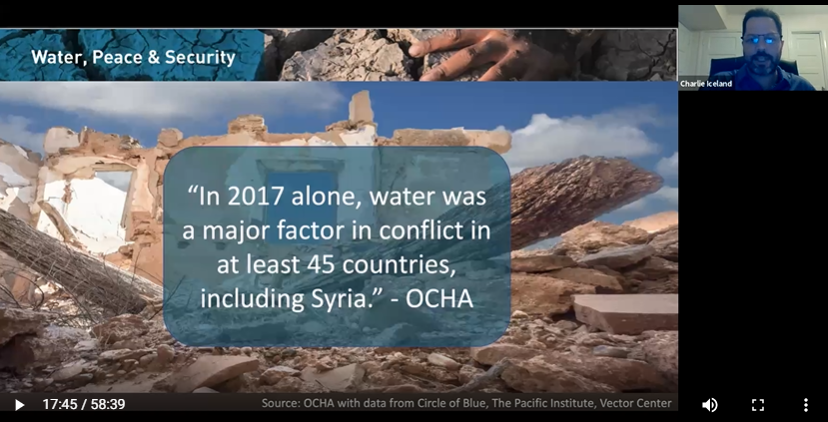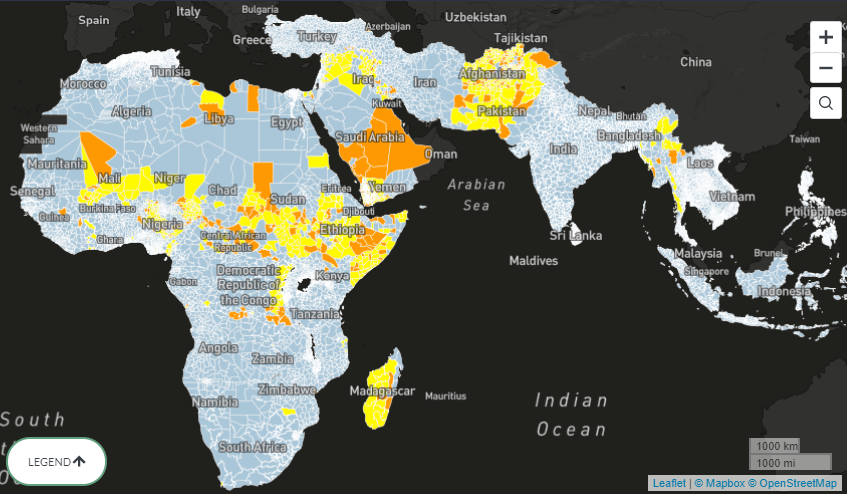By loading the video, data will be sent to YouTube. More information can be found in our data protection policy.
From forecast to prevention: Acting on resource-related conflict risks at World Water Week 2021
On August 26, 2021, the GIZ Frexus project, together with the Government of the Netherlands, the IHE Delft Institute for Water Education and the World Resources Institute invited to the session ‘From forecast to prevention – acting on resource-related conflict risks’ in the frame of World Water Week 2021. This event explored how national and international policy-makers can take effective actions to prevent conflicts relating to water, food and energy insecurity.

Stockholm World Water Week 2021
Since 1991, Stockholm World Water Week has been bringing people together to find solutions to the planet’s water-related challenges. This year, the conference focused on Building Resilience Faster: over 16,000 participants from 170 countries attended 418 digital sessions with topics ranging from climate resilience to urban sanitation to marine biodiversity.
Among the many subjects discussed, one central theme quickly became clear: these issues cannot be addressed in isolation, either geographic or sectoral. Just as water-related challenges and solutions are often transboundary, they are also frequently multi-sectoral, with complex and dynamic links to energy, and food security.
Water, Peace and Security at World Water Week
The interactive session focused on how to prioritize conflict prevention based on conflict forecasting approaches, including valuable experiences from West Africa. The GIZ project ‘Frexus: Improving security and climate resilience in a fragile context through the Water-Energy-Food Security Nexus ‘, jointly co-financed by the European Union (EU) and the German Ministry for Economic Cooperation and Development (BMZ), is working in Mali, Niger, and Chad.
The session started with opening words from Hilde Hardeman, Head of the European Commission's Service for Foreign Policy Instruments (FPI). She stressed the importance to move beyond the mere exploration of the linkages between natural resource management and security – such as issues of forced displacement – to prevent conflicts before they escalate. Throughout its work in peace-building and crisis response, the EU prioritizes preventive measures, for example, by building partners’ capacity to analyse specific climate-related security risks. In parallel, they help to create early warning systems at the local level to anticipate the evolving needs of vulnerable communities, address emerging situations and develop adaptation strategies.
“So, this is not just about analysis. It is about action.” Hilde Hardemann, Head of the European Commission's Service for Foreign Policy Instruments
Given the complexity of the interrelated issues between water, peace and security, Hardemann explained that we need comprehensive, cross-sectoral and transboundary responses to be effective, as water-related issues do not stop at borders. The EU already works closely with actors from member states, partner countries, international organizations, businesses, NGOs across the globe and through initiatives such as the Frexus project in the Sahel region.
Moreover, Hardemann highlighted the importance of empowering local communities through capacity building, so that communities themselves can design and implement climate- and conflict-sensitive measures to manage their resources and ecosystems peacefully. Thus, by acting together, and based on sound analyses, we can make a real difference that matters on the ground.
Henk Ovink, Special Envoy for Water Affairs for the Kingdom of the Netherlands, took up this point in his keynote speech. He confirmed that to mitigate climate and security risks, we need to address the intricate relationships between water, peace and security. Ovink stressed that in many hotspot areas, people are vulnerable to extreme weather conditions, affecting water access and quality, destabilizing communities. Particularly the most vulnerable are hit the hardest and longest.
“Water can take us apart as societies and our environment, with the devastating consequences that come with too much or too little water. But if we organize well, based on that understanding, these interlinkages can also bring us together.” - Henk Ovink, Special Envoy for Water Affairs for the Kingdom of the Netherlands
We need to investigate potential areas of joint action to speed up resiliency building and risk reduction from water impacts affecting global security. We need to further integrate climate-, water-, food- and energy-related security risks into strategic partnerships and implement early warning tools in our local communities. We need to closely monitor the security implications to regular reporting and examining these reports with others and highlight good practice mechanisms for climate adaptation, examining the role of water in these issues, and identifying areas of cooperation in conflict regions.
"We hold the key to a comprehensive response. Let’s unlock the tools to jointly address the nexus between water, peace and security … To make sure that a water-secure world is not a dream, but definitely a possible reality.” - Henk Ovink, Special Envoy for Water Affairs for the Kingdom of the Netherlands
The Global Early Warning Tool
One of the tools helping policymakers to identify current and potential future conflict hotspots is the Global Early Warning Tool, developed by the Water, Peace and Security (WPS) Partnership, which was further developed in the frame of the Frexus project. Charles Iceland, Global Director for Water at the World Resources Institute (WRI), showed the capabilities of the tool.

The Global Early Warning Tool can predict the risk of violent conflict up to one year in advance by using machine learning, coupled with environmental, meteorological, social, and economic data. Thus, the tool can enable global development, diplomacy, and disaster response actors to intervene and help defuse conflicts before their escalation. The tool will identify potential hotspots across Africa, the Middle East, South and Southeast Asia over the next 12 months. Presently, the tool shows that over 2,000 administrative districts across the Global South are at risk of resource-related conflict, including Iraq (Basra), Khorramshahr and Abadan (Iran), and parts of Mali, Nigeria, India and Pakistan.

How can policy-makers take effective actions to prevent resource-related conflicts?
But why is the effective implementation of preventive measures on WEF conflicts still lagging, despite the availability and accuracy of early warning capacity? Which role can early warning systems play at which stages of the decision-making process, and how can they facilitate truly preventive action?
These questions were discussed by high-level panellists from the Sahel Region as well as the international development community, amongst which were Sharon Burke, Senior Advisor for the International Security Program and Resource Security Program at New America, as well as Nouradine Zakaria Touré, President of the Regional Coordination Of Natural Resource Users in the Niger Basin (CRU-BN).
The panellists agreed that smart policy responses to WEF insecurity can bridge this gap and decrease conflict risks significantly in their local context.
Way forward
The event took the discussion on WEF insecurity and its implications for local, national and regional stability and peace further by identifying opportunities and ways for preventive action.
The outcomes of this discussion will be turned into a policy brief, providing policy-makers and those working with them with hands-on insights on how to ensure that the identification of WEF related conflict risks is indeed followed by appropriate and timely action. The policy brief will be available on the Nexus Resource Platform for download.
Further information
More information on the FREXUS project is available here.
Pour la version française de cet article, voir ici.

Related articles
- Nexus Fact Sheet // Frexus: Improving security and climate resilience in a fragile context through the Water-Energy-Food Security Nexus
- Nexus Blog // Addressing complex risks - on the ROAD to sustainable resource planning in West Africa
- Nexus Blog // Experts’ Panel on Water, Food and Energy Nexus as a Resource for Peace
- Online Event // Water, Food and Energy Nexus as Resources for Peace
